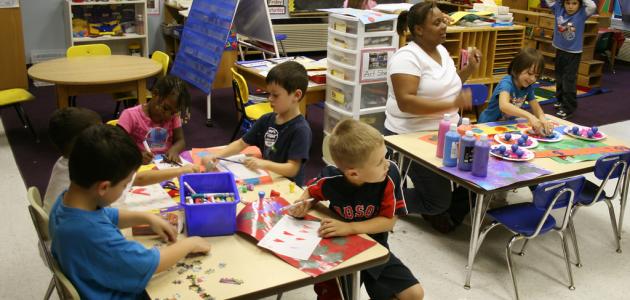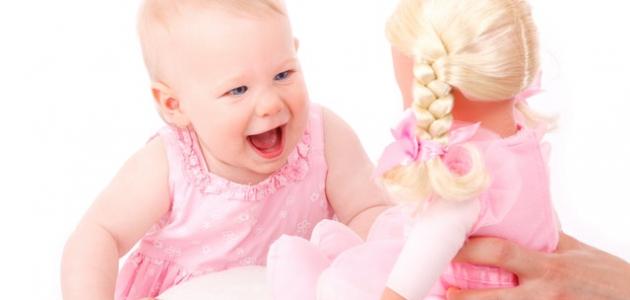Contents
The concept of raising children
Child rearing is defined as the process of bringing up a child from the moment he is born until he reaches the age of puberty . . [1] [2] [3]
The process of raising a child depends on several factors, including: the cultural influences surrounding him, how his parents were brought up in their childhood, their own religious beliefs, their willingness to accept their child as a small being who needs love at all times, and their knowledge and awareness of the right ways to support and delight him and help his growth and development properly. In the stages of childhood and adolescence, in addition to the way parents think about making decisions related to various issues, such as choosing appropriate methods to discipline and discipline their child, and the possibility of the mother working outside the home. [1] [2]
There is no specific style that can be considered the only correct method for raising a child, as the successful education of raising independent and happy children in all parts of the world is due to the use of a variety of methods and not relying on a specific method, and many studies have shown that the secret of raising a child in shape The right thing is based on the participation of parents in the care and upbringing of their child. [1]
Patterns of raising children
Researchers have identified four types of parenting patterns, each of which takes different approaches and methods, which can be identified through a number of indicators. [4] The following is a description of those patterns: [5]
- Authoritarian parenting : Authoritarian parenting is often described as strict, as they use strict discipline with their children , and the following are some of the characteristics that distinguish them:
- They focus on the use of sanctions too much, while minimizing negotiation and dialogue between them and their children.
- They adopt a one-track method of communication that is directed from them to their children, as the rules are usually presented to the child without explanation and the importance of following them.
- Parents in this pattern are characterized by the least care of their children.
- Parents in this style have high expectations of their children, with little flexibility in dealing with them.
- Undemanding: Education , often allows Almtsahlain or intolerant parents for their children to do what they want with providing little guidance to them, and can be described as friends of their children more than they are parents of them, the following are some of the characteristics that distinguish them:
- They move away from the strict method of dealing with their children, as they may sometimes set a small set of rules for them, and at other times they may not set any rules, and they also provide opportunities for their children to learn about their own problems on their own.
- Communication between them and their children is open in both directions, as they give their children the opportunity to decide and choose what they prefer for themselves rather than offering them directions.
- Within this pattern, parents are characterized by being more caring and caring for their children.
- Parents in this style have little expectations of their children, and sometimes no expectations are made by them.
- Parents without participation: , parents in this mode give their children complete freedom, and although some of them may intervene to make important decisions in parenting, others do not have complete knowledge about parenting, and therefore they often do not They interfere with the decisions and choices of their children, and here are some of the characteristics that distinguish them:
- Parents of this style do not use a specific method to control their children's behavior , as they often allow the child to do what he wants, and the reason for this may be a lack of information about how to deal and care for their child.
- Their contact with their children is limited.
- Within this pattern, parents are characterized by providing little care for their children.
- Parents in this style have few, and sometimes no, expectations of their children.
- Formal or reliable education: , parents are distinguished in this style by logical thinking and providing good care for children, and therefore their children are distinguished by self-discipline and the ability to think independently, so this type of education can be considered the best and most beneficial for children. The following are some of the characteristics that distinguish these parents:
- Establish clear disciplinary rules for children with an explanation of the reason and purpose of their development.
- Communication between parents and children takes place periodically, and in accordance with the children's level of understanding and awareness.
- Within this pattern, parents are characterized by the fact that they provide a lot of care to their children.
- Parents of this style have high expectations and goals from their children, but they are clearly laid out, which may make children put them in the list of goals to be achieved.
Child rearing strategies
Enhancing the child's self-confidence and self-esteem
The child's self-confidence must be strengthened and built and built early in childhood, as it starts from the child's feeling of love and attention from his parents from an early age, and develops over time for many different reasons and methods, as the child feels self-confidence by giving him some powers to act in some situations, And his progress towards achieving a specific goal, his family praising him and praising him for his good behavior, teaching him new skills and abilities, which makes him feel satisfied with himself, and other reasons. [6]
Teaching the child the spirit of sharing and cooperation
In his early childhood stages, the child may find it difficult to share with others a specific matter, and he may put his needs before everything, but gradually he becomes more ready to start sharing with those around him, and here the role of parents in encouraging him to do so appears through praising him and praising his behavior, and they may contribute In enhancing his participation concept by teaching him activities based on cooperation and sharing with others instead of focusing on games that aim to compete and win only. They can also involve him in some housework to develop his spirit of cooperation, such as: asking him for help in the process of watering plants, or cleaning the floors , And others. [7]
Raising the child to respect and appreciate
Parents may want to teach their children how to deal with respect with others and control their feelings, and the best means and methods for that are to apply an example in front of him that indicates behavior and deal with him and others with respect, such as listening to his speech without interrupting him, accepting his point of view, and dealing with others with kindness and appreciation, which It makes him learn that and reflects on his behavior. [8]
Teaching the child the language of apology
Usually children feel embarrassed to apologize to each other, but this is not true, as children must be raised that words of apology can be said easily and clearly, and do not constitute any embarrassment when the mistake is made by him, rather that the apology is a proper behavior for which the child is thanked Which will make him change his behavior. [9]
Development of emotional intelligence in the child
The development of emotional intelligence and the reinforcement of the concept of empathy in the child is one of the most important parenting methods that should be followed with him. Its principle is that the child puts himself in the place of others, takes into account their feelings and takes their ideas seriously. In the event of a disagreement between the child and one of his friends, the child can be asked to imagine The nature of his friend's feelings, in addition to encouraging him to manage his emotions and control them, and work in a positive way to find a suitable solution, and take into account motivating the child to express his feelings to develop his emotional intelligence , in addition to the need for him to feel the interest of his parents towards him. [10]
The importance of raising children
Raising children is an important process, children need constant care and guidance in all stages of their development, and education is not limited to the first years of their life only, but continues into adolescence, as the constant care and supervision provides a sense of mental and physical safety for children, and this in turn helps them to develop on both sides. Emotional and behavioral to the fullest. [11]
Providing continuous support and guidance to the child in his early years makes him feel reassured and safe, which helps him build his personality and develop his confidence in himself and in others, and it is worth noting that the importance of guidance and supervision during adolescence is no less than during childhood, as this helps to protect the teenager from heading to bad activities such as eating Alcohol, or depression due to going through difficult circumstances, or joining bad companions, and thus helping him to develop properly, and reducing the formation of negative behaviors that affect the child and his society. [11]
Parents should allocate time to spend with their children by practicing some activities with them, such as eating dinner, attending the school celebration, playing with them, reading a story or book to them, and other activities that help in raising them properly. Parents can also instill family values when The child and its consolidation through many enjoyable family activities such as organizing picnics and family meetings and interacting with him, which makes him realize that his family is always with him and is there for him, and although these activities seem very simple, they contribute to building trust between parents and children, and increase understanding between them. . [11]
References
- ^ A b v "What is Child Rearing?" , www.tuw.edu , 6-8-2019, Retrieved 3-4-2020. Edited.
- ^ A b "Child Rearing Practices & Parenting the Styles" , Www.bondwithbaby.com , Retrieved 3-4-2020. Edited.
- ↑ "Child Rearing" , www.psychology.iresearchnet.com , Retrieved 3-4-2020. Edited.
- ↑ Amy Morin (12-7-2019), "4 Types of Parenting Styles and Their Effects on Kids" , www.verywellfamily.com , Retrieved 3-4-2020. Edited.
- ↑ “What Is My Parenting Style? Four Types of Parenting” , www.brighthorizons.com , 6-1-2020, Retrieved 3-4-2020. Edited.
- ↑ D'Arcy Lyness (7-2018), "Your Child's Self-Esteem" , www.kidshealth.org , Retrieved 5-5-2019. Edited.
- ↑ "How to teach your child to share" , www.babycentre.co.uk , Retrieved 6-5-2019. Edited.
- ↑ "How to teach your child respect" , www.babycentre.co.uk , Retrieved 6-5-2019. Edited.
- ↑ Carol Morgan, “13 Ways To Raise Kids Who Love And Care For Each Other” , www.lifehack.org , Retrieved 5-5-2019. Edited.
- ↑ Katherine Lee (5-3-2020), “How Parents Can Raise a Good Child” , www.verywellfamily.com , Retrieved 1-29-2019 . Edited.
- ^ A b v Charu Chanana (31-8-2006), "Prevention Of Psychosocial Problems In Adolescence" , Www.bmj.com , Retrieved 3-4-2020. Edited.
















